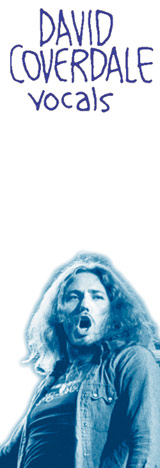 |
David Coverdale was born on September 22nd 1951 in Saltburn in the North East of England. His first home was above a club in the town run by his parents and, via the juke-box, Coverdale was turned on to bands such as The Pretty Things, The Sorrows, The Yardbirds and The Kinks. He went on to art college where he joined college groups such as Vintage 67, Denver Mule and Magdalene. At the end of 1968 this paid off when The Skyliners, a busy local outfit, asked him to join. They played all over the area and did supporting slots at the Redcar Jazz Club, soon changing their name to The Government. Some nights they played cabaret spots at night clubs, on other occasions they would be playing for college audiences, always doing covers. On one occasion in 1969 they even found themselves supporting Deep Purple at Bradford University. The band also backed people like Elkie Brooks and The Paper Dolls and had offers of full-time work. In the end the members decided not to go professional, so Coverdale left and took a job in a boutique to earn a wage and sang in the evenings with Rivers Invitation, who spawned a spin-off outfit called The Fabulosa Brothers. Coverdale was also busy writing; songs like 'Holy Man', 'Sail Away' and 'Soldier Of Fortune', all began life during this time. Stories of the departure of Deep Purple vocalist lan Gillan surfaced and the boss at the Redcar Jazz Club sent in a tape of The Fabulosa Brothers. Coverdale was invited for an audition and on December 8, 1973, found himself fronting Deep Purple for the first time in Sweden. The new band cut the Burn album, and Deep Purple went on to become the biggest selling band in America the following year. After Stormbringer when Blackmore quit, Coverdale was instrumental in persuading the others to carry on with Tommy Bolin. He was also the first to quit when it became clear the band were falling apart. 'I was frightened to leave the band. Purple was my life, Purple gave me my break but all the same I wanted out,' he later admitted. Contractural problems led to him taking time off to record two solo albums before he could begin to think of starting his own group, Whitesnake, who set out on their first low-key UK tour in 1978. Over the next twelve months first Jon Lord, then Ian Paice joined his band, who became very successful in Europe, with a number of hit singles penned by guitarist Bernie Marsden. The group underwent a number of personnel changes with Ian Paice being replaced by Cozy Powell in 1982 after which the group began to lose direction a little. In 1985 Coverdale disbanded the group completely before emerging again in 1987 with an American based band and a new album deal. The Whitesnake '1987' LP went on to become his biggest seller ever and for several years the group enjoyed enormous worldwide success. This slowed in the mid-nineties and Coverdale teamed up with Jimmy Page for a one-off album Coverdale/Page and short tour. He then moved to recording solo albums under the Whitesnake/David Coverdale banner but the touring diminished. In 2003 he returned to the stage with a new Whitesnake to promote a number of Best Of Whitesnake albums in America and Europe. |
©
2004 DPAS/Darker Than Blue.
Not to be replicated, reproduced, stored and/or distributed in any way without
prior written permission